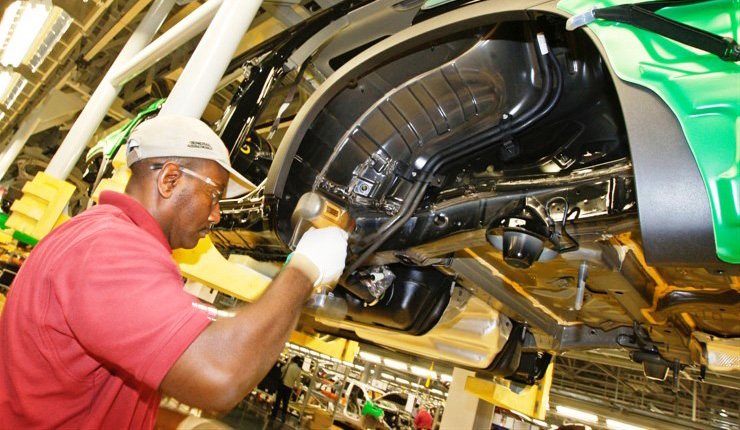
The Nigerian automotive industry has its origins in the 1970’s when the federal government entered into Joint Venture Agreements with a number of foreign automotive manufacturing firms to set up six assembly plants. More than 40 years on, the Nigerian auto industry is still very much in its infancy due to a wide range of challenges that has beset the industry, resulting in its decline. Indeed, the only car manufacturing that is currently being carried out locally in Nigeria is Semi-Knocked-Down (SKD) assembly; and this is led by three companies: Volkswagen of Nigeria (VON), Peugeot Automobile Nigeria (PAN) and INNOSON.
Successive governments have recognised the strategic importance of the Nigerian auto industry and its great potential in terms of job creation, contributions to foreign exchange earnings/savings, technology acquisition and skills development. For these reasons, the auto industry was seen as a key strategic driver for industrialisation, and an important component of the Nigeria Industrial Revolution Plan (NIRP) which was launched in 2014.
The National Automotive Industry Development Plan (NAIDP) which was subsequently launched in 2014 is aimed at attracting Direct Foreign Investment (DFI), reviving the comatose plants, attracting new automotive assembly and manufacturing plants, and encouraging the transfer of modern and advanced manufacturing technologies required for the production of affordable vehicles in the country. Another strategic objective of NAIDP is to curtail Nigeria’s dependence on imports by meeting demand with domestic production and in the longer term to make Nigeria a regional automotive hub.
The auto industry is widely recognised as the greatest engine of economic growth in the world and has been famously called “the industry of industries” by Peter Drucker. In spite of the challenging global economic recession, it remains a key sector of the economy of every major country in the world today, and is vast, accounting for more than one in ten jobs in industrialized countries.
It is for these reasons that most developing countries look to their local automotive sector to serve as the catalyst for economic growth and for technological development by capitalising on the many linkages that the auto industry has to other sectors of their economy. According to the OICA (Organisation Internationale des Constructeursd’Automobiles), the world’s automotive industry produced over 90 million vehicles (cars and commercial vehicles) in 2015 and this level of output is equivalent to a global turnover (gross revenue) of over €2 trillion or £1.6 trillion. Most importantly, automobile vehicles have become indispensable to the global economy and to the wellbeing of the world’s citizens.
In terms of exports, automotive vehicles represent the world’s number two export product, trailing only crude oil, with the global exports valued at about US$673 billion for 2015 (Workman, 2016). Germany was ranked number one with exports worth about $153 billion and 22.7% of global exports, followed by Japan with $86 billion and 12.8% of global exports. The importance of the automotive industry to the national economy can be demonstrated by the United States, which was the third ranked exporter of automotive vehicles in 2015. A study on the contribution of the Automotive Industry to the economies of all Fifty States and the United States showed that:
- Over 7 million private sector jobs are supported by auto manufacturers, suppliers and dealers in the United States
- $500 billion is paid in annual compensation to employees supported by the automotive industry
- Every vehicle manufacturer job creates almost 7 other jobs in industries across the economy
- All direct auto industry employment creates almost 4 additional jobs in other industries across the economy
The report concludes that the United States automotive industry is a critical component of economic growth with extensive interconnections across the industrial and cultural fabric of the U.S. It contributes significantly to the national and regional employment; research, development and innovation; state and local government revenues; foreign direct investment; education; health care; U.S. trade; and quality of life.
Nigeria was only ranked 95th in the world, with its automotive vehicle exports in 2015 estimated at US$2.3 million and 0.0003% of global exports. In contrast to Nigeria, South Africa, whose population is less than half of Nigeria’s 170 million people is ranked as the 19th automotive vehicles exporter in 2015, with exports worth US$5.6 billion and 0.8% of global exports. This means that South Africa is the biggest producer of vehicles in Africa, accounting for 76% of all the vehicles made on the continent and is generating 12% of exports and 7% of her GDP from the automotive industry (ECA, 2014b).
About 98% of Nigeria’s transportation is by road and data from the Nigerian Bureau of Statistics and the United Nations Conference on Trade and Development shows that vehicles valued at £2.1billion were imported in 2012 (Anon, 2014b).The annual spending on vehicles import was over N550 billion (US$3.5 billion), making it the number two user of foreign exchange in 2012 after Boilers, machinery and appliances (NAC, 2013 and Usman, 2013).In recent years, as the pioneer car assembly plants have fallen into disrepair, Nigerians have spent an increasing amount of foreign exchange for importing the majority of the vehicles on the road.
Although most of the vehicles available have been used abroad before importation, many Nigerians still own more than one vehicle and cars are bought not only for utilitarian purposes but also as a status symbol. This means that most Nigerians are eager to own new vehicles, which have been the preserve of the very rich.Regional Export potential into the West and Central African market and especially the Economic Community of West African States (ECOWAS), which has a population of 350 million people of which Nigeria is a member, also provides huge opportunities for the Nigerian Auto Industry.
Ndy Ekere
Ndy Ekere is the former dean, faculty of science and engineering, and a professor of manufacturing at the University of Wolverhampton, United Kingdom



